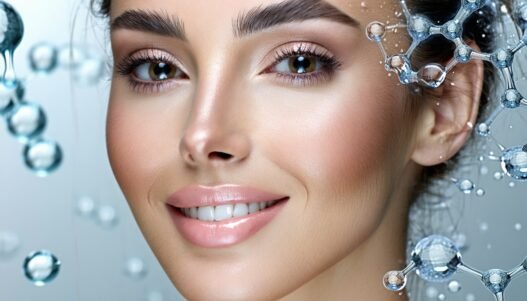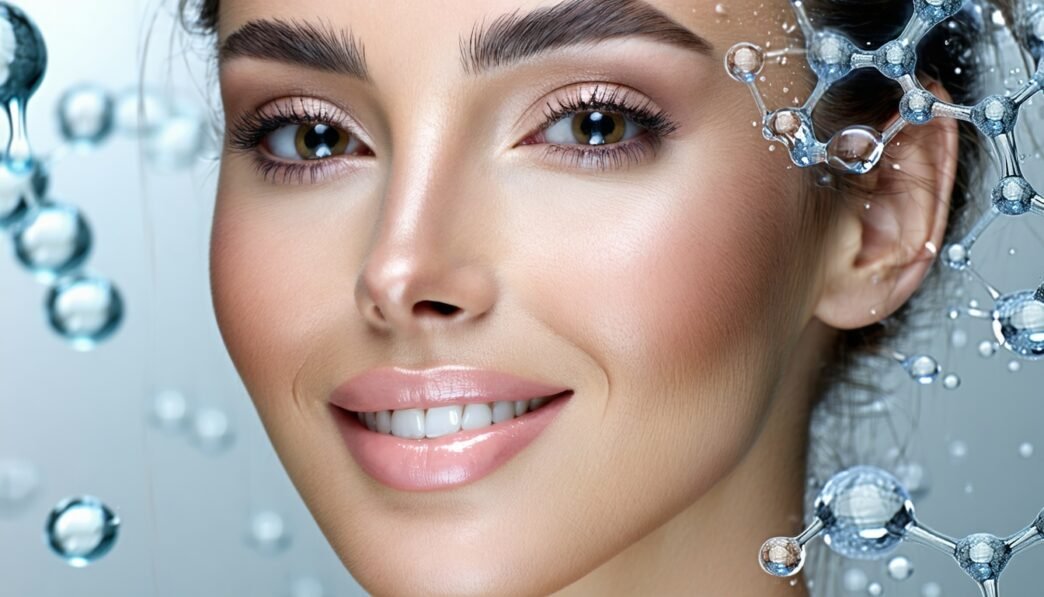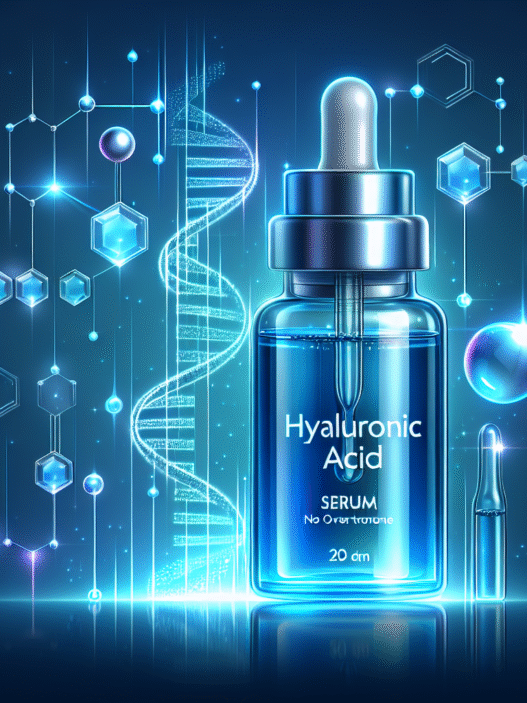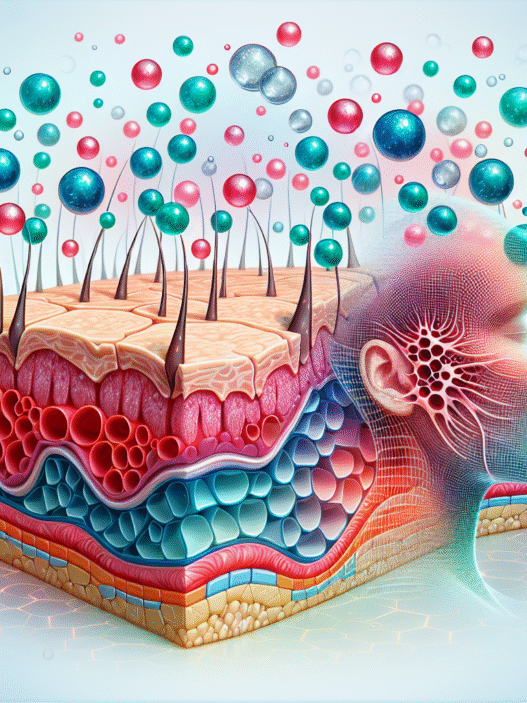Understanding Hyaluronic Acid
Significance of Hyaluronic Acid
Hyaluronic acid (HA) is a key molecule that plays a crucial role in skin health. It is prominent for its ability to hold up to 1.5 gallons of water per quarter-teaspoon, making HA exceptionally effective at hydration. This hygroscopic molecule can bind up to 1000 times its weight in water, allowing it to retain moisture in the skin and ensuring proper hydration of both the stratum corneum and the dermis (Dermatologic Therapy).
When the skin is well-hydrated, it appears plumper and more youthful, promoting overall skin elasticity. Studies indicate that HA is not only essential for skin but also plays a pivotal role in joint and eye health, making it a widely researched subject in the beauty and healthcare industries.
| Benefit of HA | Description |
|---|---|
| Hydration | Binds water molecules, providing deep hydration to the skin. |
| Elasticity | Enhances the skin’s flexibility and elasticity, reducing the appearance of wrinkles. |
| Cellular Repair | Stimulates the proliferation of dermal fibroblasts essential for skin renewal. |
Role in Skin Health
Hyaluronic acid is vital for maintaining skin health. Its high water retention capacity aids in the normalization of skin functions and helps suppress wrinkle formation within the epidermis.
As aging progresses, the natural levels of HA in the skin decrease, often leading to dryness, loss of firmness, and reduced elasticity. Environmental factors such as UV exposure, pollution, and stress also contribute to HA degradation, causing further diminishments in skin health. Topical application of HA through creams, serums, and injectable treatments can counteract these effects by replenishing lost moisture and restoring elasticity.
By integrating HA into skincare routines, individuals can potentially improve their skin’s hydration and elasticity. Popular products like hyaluronic acid serums and hyaluronic acid moisturizers are widely used to enhance the skin’s overall appearance and health.
Hyaluronic Acid and Skin Benefits
Hyaluronic acid has garnered attention for its many skin benefits, particularly in the areas of hydration and elasticity. Understanding these benefits is essential for beauty and skincare enthusiasts seeking to maintain youthful skin.
Skin Hydration Improvement
One of the most notable benefits of hyaluronic acid is its ability to significantly enhance skin hydration. A 2021 study involving 40 women, aged 30 to 65, demonstrated that applying topical hyaluronic acid twice daily resulted in marked improvements in skin hydration, wrinkles, redness, and skin texture after just six weeks (Medical News Today).
Hyaluronic acid can retain up to 1,000 times its weight in water, making it a powerful hydrator. This unique capability allows it to draw moisture from the environment into the skin, leading to plumper and more hydrated skin.
| Study Findings | Duration | Improvement |
|---|---|---|
| Topical application of hyaluronic acid | 6 weeks | Enhanced skin hydration, reduced wrinkles, improved texture |
For more on the benefits of hyaluronic acid, check our section on hyaluronic acid benefits.
Effects on Skin Elasticity
In addition to hydration, hyaluronic acid plays a crucial role in improving skin elasticity. Research shows that treatment with a specific type of hyaluronic acid, 130 kDa, resulted in a 20% improvement in skin elasticity after one month. Furthermore, participants experienced reductions in wrinkle depth and skin roughness over a span of 60 days (Healthline).
Long-term use of hyaluronic acid, whether through topical serums or oral supplements, is associated with enhanced overall skin health, flexibility, and elasticity. This can contribute significantly to a more youthful appearance.
| Study Findings | Duration | Improvement in Elasticity |
|---|---|---|
| Treatment with 130 kDa hyaluronic acid | 1 month | 20% increase in elasticity |
| Long-term use of hyaluronic acid | Varies | Improved overall skin health and flexibility |
For further insights into integrating hyaluronic acid in your regimen, consider exploring our pages on hyaluronic acid serum and hyaluronic acid moisturizer. By leveraging the hydrative and elasticizing properties of hyaluronic acid, individuals can work toward maintaining youthful, healthy skin.
Types and Sources of Hyaluronic Acid
Hyaluronic acid (HA) can be sourced and used in various forms, primarily through oral supplements and topical applications. Each method has its advantages and specific effects on skin health.
Oral Hyaluronic Acid
Oral hyaluronic acid is gaining recognition for its potential health benefits. A 2023 study involving 123 females of various ages and skin types demonstrated that oral HA improved skin hydration, skin tone, and epidermal thickness.
Moreover, research involving 40 healthy Asian men and women aged 35-64 years indicated significant improvements in skin conditions, including reduced wrinkles and enhanced elasticity, after 12 weeks of oral hyaluronic acid ingestion. Participants noted notable changes in skin hydration and transepidermal water loss compared to a placebo group (NCBI).
| Benefits of Oral Hyaluronic Acid | Impact |
|---|---|
| Skin Hydration Improvement | Enhanced moisture levels |
| Decreased Wrinkle Appearance | Smoother skin texture |
| Improved Skin Elasticity | Greater youthful resilience |
Oral HA can be taken in supplement form, making it a convenient addition to a skincare routine focused on anti-aging benefits for skin health.
Topical Application
Topical hyaluronic acid is another widely used option for skincare. Studies show that applying HA twice daily can lead to improved hydration and visible results within just six weeks. Specifically, a 2021 study noted that participants experienced enhanced skin hydration and reduced signs of photoaging with consistent use of topical HA (Medical News Today).
The mechanism by which topical HA works involves the use of high molecular weight HA forming a protective hydration layer on the skin’s surface. Low molecular weight HA, on the other hand, penetrates deeper into dermal layers, providing hydration while reducing transepidermal water loss.
| Properties of Topical Hyaluronic Acid | Benefits |
|---|---|
| High Molecular Weight | Forms protective barrier |
| Low Molecular Weight | Deep hydration and absorption |
Topical formulations can be found in various products, including hyaluronic acid serums, moisturizers, and creams. Incorporating these products into a skincare routine can help enhance skin hydration and elasticity, promoting a more youthful appearance.
For those interested in maximizing the benefits of hyaluronic acid for skin health, exploring both supplement options and topical treatments can yield significant improvements in overall skin quality and resilience.
Hyaluronic Acid in Skincare Products
The incorporation of hyaluronic acid in skincare products has become increasingly popular due to its numerous benefits for skin hydration and elasticity. Understanding the efficacy of different formulations can greatly enhance a beauty enthusiast’s skincare routine.
Efficacy of Hyaluronic Acid Serums
Hyaluronic acid is recognized for its remarkable ability to hold approximately 1.5 gallons of water per quarter-teaspoon, making it highly effective as a hydrating ingredient (Cleveland Clinic). When used in serums, hyaluronic acid can provide intense moisturization and improve overall skin health with long-term use.
The efficacy of hyaluronic acid serums can vary based on their molecular weight. High molecular weight hyaluronic acid creates a protective layer on the skin’s surface, which helps to retain moisture. In contrast, low molecular weight hyaluronic acid penetrates deeper into the dermal layers, which enhances hydration and reduces transepidermal water loss.
| Molecular Weight | Function |
|---|---|
| High Molecular Weight | Forms protective hydration layer on skin surface |
| Low Molecular Weight | Improves skin hydration in deeper layers |
In addition to improving hydration, hyaluronic acid serums have been shown to enhance skin flexibility and elasticity, making the skin appear softer and more supple (Cleveland Clinic). This dual action of moisturizing at both superficial and deep levels is crucial for maintaining youthful skin appearance. For more insight on these products, check out our guide on hyaluronic acid serum.
Combination Products for Skin
Many skincare products combine hyaluronic acid with other active ingredients to enhance its performance. These formulations can target specific skin concerns while also offering the hydration benefits of hyaluronic acid. For example, combining hyaluronic acid with antioxidants can help combat extrinsic factors that damage skin, such as UV light and pollution. These combinations can provide superior protection and rejuvenation effects.
Numerous studies have indicated that topical hyaluronic acid, whether alone or in combination with other active ingredients, leads to significant improvements in skin appearance. Regular use of these combination products can result in increased skin hydration, improved elasticity, and reduced appearance of wrinkles.
For those looking to enrich their skincare regimen, products such as hyaluronic acid moisturizer and hyaluronic acid cream integrate well with serums, further boosting the benefits of hyaluronic acid. These products can play a pivotal role in achieving hydrated, youthful skin while effectively addressing various skin challenges.
Considerations for Hyaluronic Acid Use
When incorporating hyaluronic acid into skincare routines, it’s essential to understand its properties, particularly regarding its weight, penetration ability, safety, and potential side effects.
Weight and Penetration
The molecular weight of hyaluronic acid significantly influences its effectiveness for skin benefits. Hyaluronic acid can vary in size, ranging from 50 to 1,000 kDa, with 130 kDa being particularly beneficial. Molecules of hyaluronic acid with lower molecular weights might cause inflammation, while those with higher weights tend to offer fewer benefits.
Larger molecules face challenges in penetrating the skin barrier effectively. A crucial factor is that smaller substances, typically those below 500 kDa, penetrate the skin more efficiently. Therefore, when selecting a product, it’s important to consider the molecular size, as it impacts how well the product will work to improve skin hydration, elasticity, and overall appearance.
| Molecular Weight (kDa) | Effectiveness |
|---|---|
| Below 50 | May cause inflammation |
| 50-130 | Beneficial for hydration |
| Above 130 | Limited efficacy |
Safety and Side Effects
Hyaluronic acid is generally recognized as safe for topical and oral use, but some individuals may experience mild side effects such as irritation or redness. Topical hyaluronic acid has shown promise in enhancing skin hydration and managing signs of aging without significant adverse effects. In contrast, oral ingestion of hyaluronic acid can also suppress wrinkles and improve overall skin condition, as some studies have indicated positive effects on corneal moisture and wrinkle reduction (NCBI).
Despite its safety profile, it’s prudent to start with a patch test before fully integrating a new hyaluronic acid product into a skincare regimen. This helps to ensure that no adverse reactions occur. Overexposure to extrinsic factors such as UV light, pollution, and poor diet can degrade the skin’s natural hyaluronic acid, making it essential to replenish with topical or oral formulations.
To learn more about the benefits of hyaluronic acid, explore our articles on hyaluronic acid benefits and hyaluronic acid injections for skin rejuvenation.
Future Research on Hyaluronic Acid
Ongoing studies continue to explore the potential benefits and applications of hyaluronic acid (HA) in skincare and health. Research efforts focus on understanding the intricate mechanisms of HA and its role in improving skin elasticity, hydration, and overall appearance.
Ongoing Studies on HA
Current research indicates that HA is a key ingredient used in cosmeceuticals due to its unique hydration and anti-aging properties. Clinical studies have shown that HA is not only well tolerated but also effective as an adjunct in post-surgical and facial rejuvenation procedures. Research is actively investigating the efficacy of topical HA in reducing signs of aging, including wrinkles and loss of elasticity. Results indicate significant improvements in skin hydration and appearance through both standalone and combined active ingredient treatments.
| Study Focus | Findings |
|---|---|
| Hydration and Anti-aging | HA improves skin elasticity, appearance, and hydration levels. |
| Post-surgical Use | HA is well tolerated and effective in skin rejuvenation post-treatments. |
| Combination Effects | Topical HA with other ingredients enhances wrinkle reduction and hydration. |
These findings highlight the crucial role of HA in maintaining youthful skin and suggest further exploration into optimal formulations.
Potential Developments in HA Industry
Looking ahead, the hyaluronic acid industry is poised for numerous advancements. Research continues to explore the effects of extrinsic factors, such as UV light and pollution, which can degrade HA levels in the skin. Formulations containing antioxidants are under investigation to counteract these damaging effects.
Innovative applications of HA include:
- Hyaluronic Acid Injections: New methods of using HA for aesthetic enhancements may continue to gain popularity, offering hydration and volume to targeted facial areas.
- Personalized Skincare: Developments in formulations may lead to personalized skincare solutions that consider individual skin types and concerns, optimizing the benefits of HA.
- Delivery Systems: Advancements in delivery mechanisms, such as encapsulation techniques, may enhance the penetration of low molecular weight HA into deeper skin layers, boosting hydration and efficacy (Dermatologic Therapy).
With ongoing studies and potential new products on the horizon, hyaluronic acid is likely to remain a pivotal component in the quest for healthy, youthful skin. As the industry evolves, further understanding of HA may provide innovative solutions to not just improve skin elasticity and hydration, but also address other concerns like skin repair and overall rejuvenation. For more information about the benefits, consider exploring our articles on hyaluronic acid benefits and hyaluronic acid for skin.





















